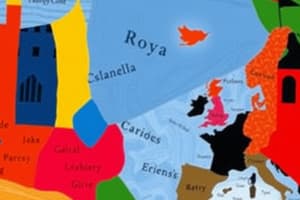Podcast
Questions and Answers
The ______ spread rapidly amongst the population, overwhelming hospitals and healthcare systems.
The ______ spread rapidly amongst the population, overwhelming hospitals and healthcare systems.
contagious
The ______ of war, the loss of loved ones and homes, left many people feeling lost and hopeless.
The ______ of war, the loss of loved ones and homes, left many people feeling lost and hopeless.
bereaved
The ______ to freedom and liberty fueled the American Revolution, leading to the birth of a new nation.
The ______ to freedom and liberty fueled the American Revolution, leading to the birth of a new nation.
constraint
The ______ conditions on slave ships offered a glimpse into the horrors of the Transatlantic slave trade.
The ______ conditions on slave ships offered a glimpse into the horrors of the Transatlantic slave trade.
The ______ of the pandemic's impact on the economy was becoming all too real for many businesses.
The ______ of the pandemic's impact on the economy was becoming all too real for many businesses.
Flashcards
Apathetic
Apathetic
Lacking interest or enthusiasm.
Cater
Cater
To provide with what is needed; supply.
Constraint
Constraint
A restriction or limitation.
Contagious
Contagious
Signup and view all the flashcards
Dissuade
Dissuade
Signup and view all the flashcards
Study Notes
Vocabulary Quiz - Fill in the Blank
-
Aptitude: Choose the best word to complete each sentence related to historical events.
-
During the World War II, many citizens displayed apathy toward the escalating threat.
-
After the World War II the people were indifferent to the suffering in Europe.
-
The Revolutionarys War brought hardship and suffering to Americans, but some remained indifferent to changing course of events.
-
During the height of the Revolutionary War, many colonists felt apathy for a unified national identity.
-
Apathy toward the crisis characterized the initial response to the Covid-19 pandemic.
-
During the escalation of the Covid-19 pandemic, many people displayed indifferent attitude to the social distancing policies.
-
The Transatlantic Slave Trade showed a disturbing degree of apathy in powerful nations in the world at the time.
-
The Transatlantic Slave Trade created indifference toward the plight of enslaved people within society.
-
The ongoing suffering during the Covid-19 pandemic may give way to apathetic attitudes from the people toward governmental assistance.
-
The fear and loss in the wake of the World War II left many apathy and lost in thought.
-
Bereaved: Choose the best word to complete each sentence related to historical events.
-
Millions were bereaved by World War II.
-
Many people bereaved by the loss of loved ones during the Transatlantic Slave Trade.
-
The Revolutionary War left many bereaved families.
-
Communities were bereaved by loss of life during the Covid-19 pandemic.
-
Families of soldiers mourned the deaths of their loved ones bereaved by World War II.
-
The bereavement of the war was widespread after World War II.
-
The Covid-19 Pandemic caused many bereavement throughout the world.
-
The suffering caused by the World War II left many bereaved.
-
The Revolutionary War left many bereaved, and scarred by the war's effects.
-
The aftermath of the Covid-19 pandemic left many families bereaved.
-
Cater: Choose the best word to complete each sentence related to historical events.
-
The Covid-19 pandemic challenged governments to cater to the needs of their citizens.
-
During the World War II some governments were very quick to cater to the needs of their citizens on the battlefield.
-
Governments struggled to cater to the needs of their citizens during the Covid-19 pandemic.
-
Leaders in many nations during the Revolutionary War failed to cater to the needs of the citizens.
-
Companies worked to cater to the changing needs of their consumers throughout the Revolutionary War.
-
The Transatlantic Slave Trade saw great cater to the needs of the slave owners.
-
Supply chains were strained during the Covid-19 Pandemic forcing companies to adapt and cater to evolving customer needs.
-
Governments were forced to cater to the needs of those displaced by the Revolutionarys War .
-
Food supplies for soldiers during the **World War II **were catered to based on specific needs on the front lines.
-
The Transatlantic Slave Trade failed to cater toward the needs of the captured African people.
-
Constraint: Choose the best word to complete each sentence related to historical events.
-
The World War II brought significant constraints on freedoms in many parts of the world.
-
The Revolutionary War caused constraints on colonial life.
-
The Covid-19 pandemic brought constraints on travel and social interaction.
-
The Transatlantic Slave Trade enforced severe constraints on captured people.
-
Many government were forced to establish constraints to protect the health of their countries.
-
The war efforts during World War II established strict constraints on resource use.
-
Covid-19 caused significant constraints on the public.
-
Economic constraints were common during World War II.
-
Social constraints were common during the Covid-19 pandemic.
-
The Revolutionary War brought about severe constraints on the American people.
-
Contagious: Choose the best word to complete each sentence related to historical events.
-
The Covid-19 was a highly contagious disease.
-
Many diseases were contagious in the world during the Revolutionary War.
-
Public health measures were implemented in response to the contagious nature of the Covid-19 pandemic.
-
The spread of disease was a central concern in the World War II, with a heavy reliance on sanitary practice to control the contagious diseases.
-
The Covid-19 disease was contagious on a worldwide basis.
-
The contagiousnature of the Covid-19 pandemic showed public health measures necessary to limit its spread.
-
Some diseases were contagious in the world during the height of World War II.
-
Many communicable diseases were contagious to the people in the Revolutionary War.
-
The contagious nature of the Covid-19 pandemic influenced public health policy.
-
The Revolutionary war also impacted public health due to the contagious nature of disease spread.
-
Deprive: Choose the best word to complete each sentence related to historical events
-
The Transatlantic Slave Trade caused millions to be deprived of their freedom and basic human rights.
-
The Revolutionary War deprived Americans of their opportunities to experience a more secure future.
-
The Covid-19 pandemic restricted access to essential services, ultimately depriving many people of resources.
-
The World War II caused citizens to be deprived of their freedom and economic security in many parts of the battlefield.
-
Depriving people during the Covid-19 pandemic was an ongoing, global problem.
-
The loss of loved ones deprived many people of emotional support.
-
The Transatlantic Slave Trade deprived millions of their families for life.
-
The Revolutionary War deprived people of their homes, property and even life on occasion.
-
Public health measures were implemented to prevent people being deprived of resources.
-
Many citizens were deprived of basic necessities during the Covid-19 pandemic.
-
Dissuade: Choose the best word to complete each sentence related to historical events.
-
The Covid-19 pandemic served to dissuade people from traveling to certain locations.
-
Leaders of the war dissuaded people from participating in the war through various news reports and propaganda.
-
The severity of the World War II caused many to dissuade from going through with an action.
-
Leaders and citizens attempted to dissuade the public from taking part in the Revolutionary War.
-
The Revolutionary War also caused people to dissuade the public from coming to certain conclusion on the future outlook of the country.
-
The World War II saw the dissuading of many soldiers and their families from traveling or participating in certain actions.
-
The contagious nature of the Covid-19 pandemic dissuaded many people from certain actions.
-
The World War II dissuaded many people from believing in the cause they were fighting for.
-
The Revolutionary War dissuaded many loyalists and patriots from engaging in battle.
-
The Covid-19 Pandemic served as a cautionary tale and caused many to dissuade the public from participating in certain actions.
-
Foretaste: Choose the best word to complete each sentence related to historical events.
-
The World War II proved to be a foretaste of what was to come in the following decades.
-
The Covid-19 pandemic served as a foretaste of the challenges presented by global crises.
-
The Revolutionary War served as a foretaste of what was to come for the newly formed country.
-
The Revolutionary War was seen as a foretaste of a larger movement to come.
-
The Transatlantic Slave trade left a taste on the world that was seen as a foretaste of what was to come.
-
The Covid-19 pandemic provided a foretaste of the potential difficulties in managing global health emergencies.
-
The World War II was a foretaste of the destructive power of modern warfare.
-
The Transatlantic Slave Trade provided a foretaste of the impact that unethical practices on a global level could have on other nations.
-
Many believe the Revolutionary War was a foretaste of the political strife to come.
-
The Covid-19 pandemic was labeled a foretaste of the public health challenges to be faced throughout history.
-
Imperceptible: Choose the best word to complete each sentence related to historical events.
-
Some of the early signs of the Covid-19 pandemic were imperceptible to the general public.
-
The Revolutionary War started with some imperceptible signs of struggle in the Colonies.
-
The World War II escalated to a point that had some imperceptible moments of doubt among soldiers.
-
The Covid-19 pandemic showed that minor developments that started imperceptibly can cause significant problems throughout society.
-
The World War II involved a gradual increase in violence that started imperceptibly.
-
The rise of tensions leading up to the Revolutionary War were mostly imperceptible to the colonist.
-
The early signs of the Transatlantic Slave Trade were imperceptible.
-
Imperceptible changes over time eventually caused changes in the attitudes during the Revolutionary War.
-
The World War II started out as some imperceptible points in time.
-
The Covid-19 pandemic began to rise in severity as some imperceptible moments that continued to grow.
-
Indifferent: Choose the best word to complete each sentence related to historical events.
-
Public reaction to the early stages of the Covid-19 pandemic was indifferent in some countries.
-
The early outbreak of the Transatlantic Slave Trade demonstrated an initially indifferent attitude from many in influential positions in the world to the plight of the enslaved Africans.
-
The Revolutionary War showed how indifferent some countries in the world were to the suffering of citizens.
-
Many leaders and citizens were indifferent to the potential dangers of the World War II.
-
The World War II brought a significant amount of indifferent attitudes from citizens in many nations.
-
The severity of the Covid-19 Pandemic caused citizens to be more indifferent to the government's assistance.
-
The response to the early stages of the Covid-19 pandemic showed that some countries were indifferent to public health issues.
-
The Transatlantic Slave Trade is an example of how indifferent some powerful nations can be toward serious human crises.
-
The Revolutionary War showed how indifferent some people may be to the outcome of a serious confrontation.
-
The World War II showed that many people were indifferent to their own well-being due to the war effort that was going on.
Studying That Suits You
Use AI to generate personalized quizzes and flashcards to suit your learning preferences.




